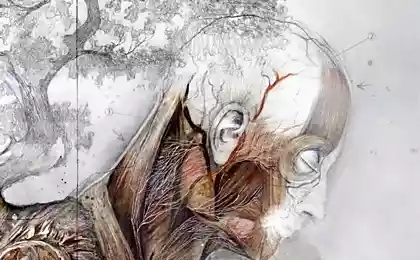472
Living on the edge: borderline personality disorder
They rarely leave anyone indifferent: they either patronize fever or feel ill manipulators. And they need respect and acceptance.
They keenly perceive life and emotionally vulnerable. Sometimes feelings so overwhelm them that they cannot understand what they feel and do not know how to handle it. They are sensitive and vulnerable, they have a vivid imagination and figurative language.
They often behave impulsively, and regret. The power of emotion in combination with a weak ability to cope with them and make others afraid of them or fear for them.

They are often angry and their anger is frightening, but more often they cause damage to others and yourself. Many of them at least once resorted to campbridge action or tried to commit suicide. Helplessness and despair. From self-hatred. To feel alive.
They know little themselves, their characteristics, needs and desires, but often hate myself. Even a small mishap or everyday troubles make them feel to blame, might not be able to eat.
Others often find it difficult to understand them, and they know it. Sometimes they amaze with their ability to cope with complex problems and achieve great things in the most difficult conditions. And sometimes they give in to situations that to most seem to be easy. And it's hard for them to trust themselves, because they rarely know what's going to deliver them to a standstill, and they are easy to handle.
They are desperately afraid of loneliness and not feeling able to cope with life on their own. They do not know how to take care of yourself, to constructively defend their interests and are not sure you have that right. Therefore, they often vstupayut destructive relationship in which they are used, betrayed, humiliated.
It is always difficult and anxious: and in a relationship and alone.
As a rule, they are smart and gifted, and capable of much. And if they can create a sustainable positive attitude, to cope with their emotional storms and to believe in themselves, they are charming, loyal to his friends and family and is very productive.
Look around, some of us — it's them. Some of them is you. People with borderline personality disorder.

Described in the dry language of the DSM-IV, world of a person with borderline disorder is:
1) the tendency to make excessive efforts to avoid real or imagined fate of being abandoned (does not include suicidal behaviour and acts of self-harm described in criteria 5);
2) the tendency to engage in intense, intense and unstable relationships characterized by alternating extremes of idealization and devaluation;
3) identity disorder: marked and persistent instability of the image or feeling I;
4) impulsivity, manifested in at least two areas, which involve self-harm, e.g. spending money, sexual behavior, abuse psychoactive substances, traffic violations, excessive overeating (does not include suicidal behaviour and acts of self-harm described in criteria 5);
5) recurrent suicidal behavior, hints or threats of suicide, acts of self-harm;
6) affective instability, changeable mood (e.g., intense periods of dysphoria, irritability, or anxiety usually lasting a few hours and only rarely few days more);
7) constantly feel a sense of emptiness;
8) from a maladaptive manifestation of extreme anger or difficulty associated with the need to control feelings of anger (e.g., frequent displays of temper, constant anger, recurrent physical fights);
9) transient, stress-induced paranoid ideas or severe dissociative symptoms.
Also interesting: the Conflict between the desired and the real
14 of the best films about psychotherapy
For the diagnosis of BPD (BPD), you must have at least five characteristics.
Leading symptoms of borderline personality disorder in DSM-IV are:
Source: www.psychodinamica.ru/pogranichnoe_rasstroystvo_prl_bpd.php
They keenly perceive life and emotionally vulnerable. Sometimes feelings so overwhelm them that they cannot understand what they feel and do not know how to handle it. They are sensitive and vulnerable, they have a vivid imagination and figurative language.
They often behave impulsively, and regret. The power of emotion in combination with a weak ability to cope with them and make others afraid of them or fear for them.

They are often angry and their anger is frightening, but more often they cause damage to others and yourself. Many of them at least once resorted to campbridge action or tried to commit suicide. Helplessness and despair. From self-hatred. To feel alive.
They know little themselves, their characteristics, needs and desires, but often hate myself. Even a small mishap or everyday troubles make them feel to blame, might not be able to eat.
Others often find it difficult to understand them, and they know it. Sometimes they amaze with their ability to cope with complex problems and achieve great things in the most difficult conditions. And sometimes they give in to situations that to most seem to be easy. And it's hard for them to trust themselves, because they rarely know what's going to deliver them to a standstill, and they are easy to handle.
They are desperately afraid of loneliness and not feeling able to cope with life on their own. They do not know how to take care of yourself, to constructively defend their interests and are not sure you have that right. Therefore, they often vstupayut destructive relationship in which they are used, betrayed, humiliated.
It is always difficult and anxious: and in a relationship and alone.
As a rule, they are smart and gifted, and capable of much. And if they can create a sustainable positive attitude, to cope with their emotional storms and to believe in themselves, they are charming, loyal to his friends and family and is very productive.
Look around, some of us — it's them. Some of them is you. People with borderline personality disorder.

Described in the dry language of the DSM-IV, world of a person with borderline disorder is:
1) the tendency to make excessive efforts to avoid real or imagined fate of being abandoned (does not include suicidal behaviour and acts of self-harm described in criteria 5);
2) the tendency to engage in intense, intense and unstable relationships characterized by alternating extremes of idealization and devaluation;
3) identity disorder: marked and persistent instability of the image or feeling I;
4) impulsivity, manifested in at least two areas, which involve self-harm, e.g. spending money, sexual behavior, abuse psychoactive substances, traffic violations, excessive overeating (does not include suicidal behaviour and acts of self-harm described in criteria 5);
5) recurrent suicidal behavior, hints or threats of suicide, acts of self-harm;
6) affective instability, changeable mood (e.g., intense periods of dysphoria, irritability, or anxiety usually lasting a few hours and only rarely few days more);
7) constantly feel a sense of emptiness;
8) from a maladaptive manifestation of extreme anger or difficulty associated with the need to control feelings of anger (e.g., frequent displays of temper, constant anger, recurrent physical fights);
9) transient, stress-induced paranoid ideas or severe dissociative symptoms.
Also interesting: the Conflict between the desired and the real
14 of the best films about psychotherapy
For the diagnosis of BPD (BPD), you must have at least five characteristics.
Leading symptoms of borderline personality disorder in DSM-IV are:
- marked instability in interpersonal relationships,
- emotional instability,
- severe impulsivity.published
Source: www.psychodinamica.ru/pogranichnoe_rasstroystvo_prl_bpd.php
























